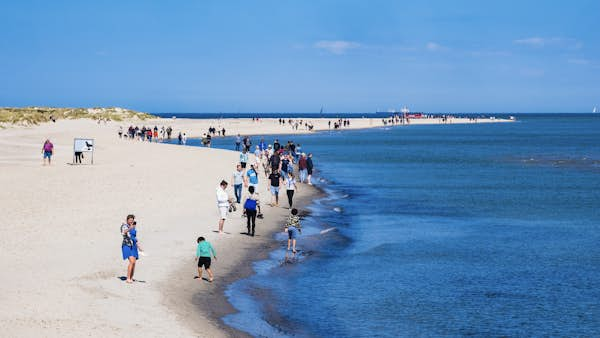When is the best time to visit Denmark? Truly, whenever you want.
Tourists visit this Scandinavian star year-round. It’s a popular place for city breaks in the autumn, winter and spring, with trips focused on hiking and outdoor exploration happening largely in the summer.
Indeed, summer is peak season in all senses of the word. The sun shines, with temperatures hitting the mid 20°sC (70–80°F) – and prices reaching sky-high levels. While the weather can be a little less predictable, the shoulder seasons of April to May and September to October offer a similar appeal – but for less.
Because the weather in Denmark it is so changeable – and thus something any Dane will talk about anywhere, anytime – be aware that the country gets buffeted by winds, suffers heavy cloudbursts in the summer months and is a place where you always need to pack waterproof layers. A local saying goes, ”There’s no such thing as bad weather, only bad clothing.” And locals always know best, no?
At a high latitude, Denmark also marks its seasons through extreme swings in its daylight hours. In winter, the sun sets around 3:30pm; in summer, the sky can stay light until 11pm or later. Whatever the time of year, a passion for friluftsliv – outdoor life – obtains.
In Danish culture, as long as you have the right clothes and understanding of what the weather might wreak, it’s fun to embrace this nature-first spirit.
Peak hygge happens from September to November
Post-summer, the late sun continues to linger into September. Danes call this sensommer – and celebrate it as its own little mini season. Indeed, the early part of fall can be wonderful, with long golden days ideal for pursuing water sports, exploring small towns, visiting galleries and sitting at streetside cafes, soaking up the rays. As the days get shorter and colder (it happens quick), Denmark moves into hygge season, when outdoor cafes require wrapping up in blankets – and a cozy vibe is palpable wherever you go.

November and December are best for festive cheer
From the moment the first Christmas beer is served on November 5 until Christmas Day (celebrated in Denmark on December 24), the months of November and December are filled with joy – dark and rainy though they may be. Christmas markets spring up at farm shops, castles and manor houses, and on street corners in every city. One of the best and most popular markets takes place in the Tivoli Gardens in Copenhagen from November 15 to January 5. Look forward to stalls, an ice-skating rink, festive ballets like The Nutcracker and attractions for all ages.
To save money, travel from January to April
After all the Christmas festivities, true Scandinavian winter sets in. This season does’t deliver the weather you would choose for a hiking holiday: sometimes horizontal rain, often high winds and short, dark days. Such weather, however, means that hotel rates are at their cheapest – except, perhaps, at the end of January in Copenhagen, when Fashion Week takes place.
In a bid to attract visitors, Dining Week in February brings set menus at top restaurants at great prices – and a bit of fun. The nationwide music festival Winter Jazz seeks to do the same, while the Copenhagen Light Festival brings together international light designers in an outdoor exhibition designed to buoy the spirits.

March and April bring unpredictable weather – and lots of festivals
As the Danish version of Mardi Gras, Fastelavn, approaches, bakery hysteria reaches fever pitch. Kids gather to hit a piñata-like barrel full of sweets, and bakeries compete to create the most lavish cream-filled buns.
The weather at this time of year is highly changeable. Pack an umbrella for sure – but be ready for snowflakes, high winds or the emergence of spring sun (or perhaps all at the same time). The CPH:DOX documentary film festival offers a safe haven from unpredictable weather along with a world-class program. Horsens Prison runs a crime fiction festival – very on the nose for this cozy time of year. And on March 22, hope returns as Tivoli Gardens in Copenhagen opens for its summer season.
Marathon runners love May and June
The weather is great, flowers are blooming and Danes make the most of it by exercising and socializing. Copenhagen Marathon takes place in May, as does a country-wide event created by King Frederik: the Royal Run, a community-focused event designed to get Denmark moving and held in multiple locations all over the country. June brings music and parties aplenty, from Distortion, Europe’s largest street party, which takes place in Copenhagen; to the Heartland Festival at beautiful Egeskov Castle in Fyn; Northside in Aarhus; and Copenhell, a metal festival in Copenhagen. Roskilde, Denmark’s most internationally focused music festival, happens each year on the last weekend in June.

July and August are best for weather
School holidays start in July – which is when Danes typically leave the cities to head to a family summer home on the coast or in the countryside. This makes cities feel a little quiet at this time. Among the many charming local festivals taking place across the country is Kerteminde Cherry Festival in July, which celebrates local produce; take a look for herring festivals as well as other parties spotlighting food and sustainability.
Happening each year in the woods near Fredericia, Smukfest is one of Denmark’s most beautiful music and culture festivals. Pride Week in Copenhagen takes place in August and stops traffic with floats, live music and a grand parade.

